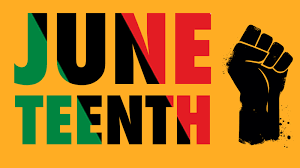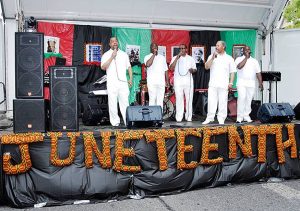Juneteenth Freedom Day

“My guest blogger this week is my assistant Megan Thomson Connor. Megan is a gifted writer and arts administrator who discusses the history of Juneteenth in the blog below. ” – Janet Langsam
In 2020, New York State Governor Andrew Cuomo issued an executive order recognizing Juneteenth as a holiday for state employees. Westchester County officials decided to do the same on the county level. This decision came 17 years after New York State proclaimed that June 19th is to be known as Juneteenth Freedom Day. Midst pandemic, it was hard to celebrate this hard-earned recognition, but this year, Juneteenth celebrations will be happening all over the County, both virtual and in-person, and it all kicks off June 1st!
Now for a history lesson, for those that need it. Juneteenth is the celebration of the commemoration of the ending of slavery in the United States. No, not the celebration of President Lincoln’s Emancipation Proclamation. This is the celebration of all of the slaves in the United States being freed. On June 19th, 1865, two and half years after the Emancipation Proclamation, Major General Gordon Granger’s led his Union troops into Galveston, Texas, with news that the war had ended and that the enslaved were now free. There are a few theories about the significant delay in the receipt of this important news. Some believe it could have had to do with President Lincoln’s lack of authority over remaining rebellious states. Some say the messenger was shot. Others think it was the reluctance of the plantation owners who failed to inform the enslaved. Whatever the reasons, it was past time for conditions to change.
As the newly freed migrated to the north or other states in the south where they had family, their hardships were far from over. Settling into these new areas as “free” men and women brought on new realities and the challenges of establishing themselves as black people in America. Recounting the memories of that day in June of 1865 served as a motivation and a release from racial tensions. Juneteenth became a time to reassure each other, pray, barbecue, tell stories, wear traditional dress, and celebrate freedom with family.
Why didn’t you learn about this in school? According to juneteenth.com, sadly, little interest existed outside the African American community to join the festivities. In some cases, there were even displays of resistance when towns or villages barred the use of public property for Juneteenth celebrations. However, for decades Juneteenth flourished, the celebration growing continuously until economic and cultural forces in the early 1900s took hold. Classroom textbooks proclaimed Lincoln’s Emancipation Proclamation of January 1st, 1863 as the date signaling the ending of slavery, erasing the significance of June 19th. As July 4th was already the established Independence holiday, a rise in patriotism steered more toward this celebration.
Then the Civil Rights movement motivated protesters to initiate Juneteenth celebrations where there weren’t already, just as the Black Lives Matter movement last summer fueled a national awareness of this holiday outside of the African-American community.
Today, the future of Juneteenth is bright, and the number of activities happening across the County shows that. Join the community as we celebrate the achievements of the African American community and encourage self-development and respect for all cultures.
For a full list Juneteenth celebrations in Westchester, visit artswestchester.org/juneteenth2021.



Connect with Janet